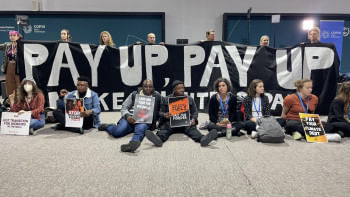Russian shadow over Donald Trump

As we approach January 20, 2017, all eyes are fixed on the inauguration of one of the most talked about President-elects of America – Donald Trump. What is appalling is that the shadow of Russia looms large over Trump's presidency.
A curious controversy linking Trump with Russia's Vladimir Putin has been raging since November 8, 2016 – the day Trump won the race to the White House. First came the allegation that Russia was actively involved in hacking and swaying the results of the election in favour of Trump. And the second rumour is that Russia has an incriminating dossier on Trump.
It now appears from all the news that has come out that the Russian hacking allegations may be true after all. All seventeen US agencies involved in intelligence have concluded that Russia did interfere with the US election and have briefed the President-elect on January 6, 2017. Trump apparently did not accept the conclusions, though he appreciated the work done by the agencies. Kremlin, however, has dismissed all these allegations as an "absurd and political witch hunt".
An enraged President Obama not only expelled 35 Russian diplomats from Washington on December 30, 2016, but also imposed a series of new sanctions against Moscow. President Putin, however, refrained from retaliating, hoping to improve relations with the new Trump administration.
The second rumour relates to a compromising dossier on Trump. The explosive story speaks of lurid details from Trump's visit to Moscow in 2013 for the Miss Universe beauty pageant. Trump stayed in the Ritz Carlton hotel, from where Russian spy agency FSB obtained compromising sexual material, which the Russians can use to blackmail Trump. The 35-page report, including a two-page summary on the Russia-Trump dossier was compiled by a British MI6 spy named Christopher Steele, who once worked at the British Embassy in Moscow. The report has been circulating in Washington for months, but no one took notice as it was not corroborated. It was when the two-page summary was published by Buzzfeed that it created a firestorm in the media and political circles. Though CIA thinks that the report is "credible", it has remained unsubstantiated. If the rumour turns out to be true then Donald Trump can become a victim of Russian blackmail. How far these stories are true is a matter of conjecture. Moscow, however, denied having any dossier on Trump.
At his first press conference on January 11, after being elected President, Trump denied all the charges declaring, "It's all fake news. It's phony stuff." Earlier Twitter-happy Trump had rejected Russian hacking allegations by the US intelligence agencies. At the press conference, he admitted for the first time that Russia may have interfered with the election along with others. What is most amazing is the aggressive and denigrating way he spoke at the press conference, deriding the media and the intelligence agencies. The agencies and the President-elect are now at loggerheads.
Clearly, Trump's denial mode speaks about his alleged complicity in the election process. When someone has knowingly done something wrong, he goes on the offensive to defend his misdoings. From his tweets, one can conclude from Trump's admiration of Vladimir Putin why he is on the defensive. He does not want Putin to reveal the incriminating dossier and is willing to build good relations with Putin. But as a former KGB officer, Putin may well exploit the weaknesses and flaws of Donald Trump.
Vladimir Putin is a smart president, who seems determined to undermine Western democratic institutions. He also has strategic plans to split the Western alliance, particularly the US-led Nato and the European Union. Putin considers Nato a serious threat to Russian security and Moscow's influence in the region. Ever since the annexation of Crimea in 2014 by Russia, relations between the West and Moscow deteriorated significantly. The confrontation further exacerbated when Putin aggressively got militarily involved in the Syrian civil war in 2015, and pushed America to a position of an onlooker.
After becoming president for the second time in 2012, Putin seems to be working to regain the bygone glories of the Soviet era. Putin wants Russia to be recognised as a major world power. This is where the adversarial confrontation begins between Washington and Moscow. Washington seems unable to contain Putin's aggressive geopolitical adventures. Russia is perceived to be a threat to American military superiority. It is an era of a new Cold War between the two powers.
Interestingly, at the ongoing Senate hearings on confirmations of Trump's new cabinet nominees, the issue of Russian interference in the election and its domination in the Middle East has repeatedly come up for serious discussion. Both Secretary of State nominee Rex Tillerson and Secretary of Defence nominee James Mattis grossly differed with Donald Trump, and branded Russia as a "danger" and "key threat" to America. Both, however, agreed that they need to look at the reality and engage with Moscow to identify areas of cooperation and subjects of discord.
Donald Trump and his surrogates firmly believe that all allegations of Russian involvement are a raucous accusation fuelled by the Democrats and his opponents. Democrats are out to delegitimise the election and his presidency, he alleges. All of Trump's reactions so far have been based on this conviction. The Russian element was actually introduced by Trump himself when in one of his TV debates with Hillary Clinton, he asked Russia to recover the missing emails of Clinton. Since then, the Russian spectre remained to bedevil Trump's election victory.
What is happening to Donald Trump just before his swearing-in is unprecedented. USA Today reported on January 10 that his polls rating conducted by Quinnipiac University has dropped to 37 percent. It appears that Vladimir Putin is crawling under Donald Trump's skin.
The writer is former Ambassador and Secretary.


 For all latest news, follow The Daily Star's Google News channel.
For all latest news, follow The Daily Star's Google News channel. 



Comments